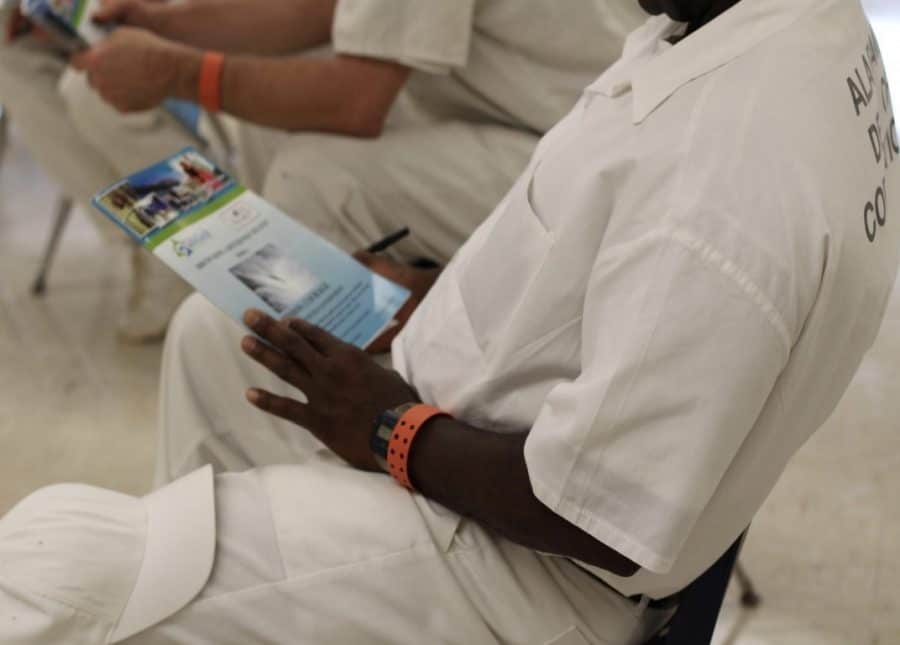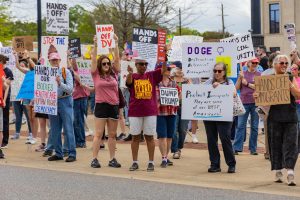‘A Way Out’: How these local groups are preparing Alabama prisoners for reentry
Reentry is notoriously difficult for formerly incarcerated Alabamians. But a novel program is putting Tuscaloosa on the map for addressing those challenges head on.
March 24, 2021
Formerly incarcerated people face a broad set of challenges upon their release, like finding a job and securing housing while also building or strengthening a social network. Some local programs aim to provide support throughout this process.
The state of Alabama prisons
A 2019 report published by the Bureau of Justice Statistics revealed that Alabama had the most overcrowded prisons in the country, operating at 176% of the lowest potential capacity. Alabama also had the largest increase in prison population of any state between 2017 and 2018 with the addition of 1,500 prisoners.
The Department of Justice filed a lawsuit against Alabama for overcrowded and unsanitary prisons last December. The Department’s investigation alleged a pattern of excessive force against men in Alabama prisons.
However, the challenges faced by inmates do not end at their release. Though the mission of Alabama prisons includes the “rehabilitation and successful reentry of offenders,” formerly incarcerated people in the United States are often unequipped to reenter society.
Upon their release, inmates are given “gate money” to help with transportation costs, which is typically $10 in Alabama. Gary Nichols, former chairman of the West Alabama Works steering committee, a regional council on workforce development, said released inmates in Alabama face a helpless situation.
“They give him $10 on release,” Nichols said of a formerly incarcerated worker. “He doesn’t have a driver’s license. He rides a bus to town. He has nowhere to live and there’s no place for him to start.”
Nationwide, about two-thirds of formerly incarcerated people will be arrested again within three years of release. The number of former prisoners who will be arrested again is a little lower in Alabama, but the reasons for revisitation are the same. Without access to transportation, housing, employment and healthy social support networks, more than 30% of those released from Alabama prisons return within three years.
Local programs address challenges of reentry
The obstacles faced upon reentry into society are further exacerbated when inmates do not have access to educational programs. A network of Tuscaloosa businesses, nonprofits and government agencies largely led by West Alabama Works have established programs to address the challenges facing formerly incarcerated people.
The program, which supports successful reentry into society, is one of at least 34 reentry programs in Alabama. LIFELINK is one of the programs partnered with West Alabama Works. Church of the Highlands supports the organization through funding and volunteers.
LIFELINK participants are selected by Gil Franks, the executive director, after an application and interview process. They live in a special dormitory in the Bibb County Correctional Facility 36 miles from the University. Franks said the program’s goal “is to develop [the inmate’s] behavior, not their skill set.”
“When they came home, no one had prepared them with the mindset, skill set and life skills to come back and be a productive employee,” Franks said.
Most participants enter the program for the last two years of their sentences and take classes taught by both full-time instructors and volunteers, including UA students from the Culverhouse LIFT program.
After being granted parole and graduating from the program, some participants will move an hour east into a transitional housing facility in Shelby County. One of LIFELINK’s employees, Mike Burns, who was also formerly incarcerated, manages the facility and serves as a mentor to its residents.
While Burns was serving his second sentence, he enrolled in LIFELINK’s classes. He said the program’s classes helped him most in his transition out of prison.
“[The classes] gave me the tools to solve problems,” he said. “When I got out this time, I didn’t let one mistake derail everything. This time was different. When I made a mistake I owned it.”
Employment opportunities
At least four Tuscaloosa industrial companies partnered with West Alabama Works have shown interest in employing participants of local reentry programs.
Phifer Incorporated, a local manufacturer, has already taken action. Over the last four years, Phifer has designed a system to provide resources to formerly incarcerated employees in their transition from prison to employment.
Chesapeake Consulting, a local firm specializing in workforce development, collaborated with Phifer and LIFELINK to identify barriers faced during the transition. Russell Dubose, Phifer’s human resources director, said affordable housing is the primary obstacle to a successful transition in Tuscaloosa.
LIFELINK participants who have been recommended for hire are transferred from parole in Shelby County to Tuscaloosa County, where they move into one of three transitional housing facilities owned by Phifer. For the first six months, these new employees live rent- and utility-free as they adjust to the demands of their new way of life. One staff member, who was also formerly incarcerated, supervises the housing and acts as a mentor to new employees.
In the second phase of the program, employees move into a second Phifer house and are expected to pay for half of the associated costs. Between nine and 12 months later, these employees have saved enough money to move into their own apartments, which they can sublease from Phifer.
Despite the resources and time West Alabama Works and its partners have spent supporting the successful reentry of formerly incarcerated people, Phifer has only been able to hire six graduates of the LIFELINK program because of state parole board changes, which have significantly slowed prisoner releases.
State-wide policies slow progress
Inmates in Alabama face overcrowded, unsanitary conditions, and Governor Kay Ivey’s office played a role in limiting the number of prisoners being released on parole.
In 2018, one inmate serving time for a nonviolent crime was released on parole and later killed three people in a home invasion. In response, Ivey pushed for legislation that gave her the power to appoint the parole board director. She appointed Charlie Graddick, a prosecutor from Mobile, Alabama who stopped all parole hearings for two months.
About three months after parole hearings resumed, the COVID-19 pandemic suspended them for an additional two months. The number of parole approvals has decreased dramatically over the last three years, from 53% to 20%.
One inmate participating in the LIFELINK program has been helping Franks build a computer database for the nonprofit while serving his sentence. The inmate went up for parole and was told he’d serve five more years, according to Franks.
Franks said the stall in parole releases has wounded the morale of inmates. Even those with access to programs like LIFELINK do not expect to get a hearing, let alone be granted parole.
“On the inside, there’s no hope,” Franks said. “And when you find a man that has no hope, he has no reason to do right.”
But Alabama might see a change soon. Ivey appointed Senator Cam Ward as the head of the parole board at the end of last year. Ward is a long-time advocate for reentry programs and prison reform.
Local expansion
Other programs are being established in the Tuscaloosa community to address the issue. The new Chamber of Commerce building in downtown Tuscaloosa will house a program from the Community Corrections Board, an agency that oversees the alternative sentencing program. This new and currently unnamed program plans to launch later this year.
Tripp Powell, local business leader and chair-elect of West Alabama’s Chamber of Commerce, has been a driving force behind the organization.
“The mission of the new reentry program is to provide a way out of a cycle of crime for former prisoners who want it,” Powell said. “Through education, mental health care, job training, job placement and an overall support system based in accountability, we believe that their stories can be rewritten.”
The program’s daily operations will be handled by the Community Service Programs, which already provides a myriad of services for low-income families in Tuscaloosa. Cynthia Burton, executive director of the Community Service Programs, said the program will provide programs and services that lead to self-sufficiency and positive outcomes for formerly incarcerated citizens.
They plan to provide services like life skills training, parent building skills, mental health support, basic education, job skills training and gainful employment. This type of training and support will result in a “forward and upward” approach to the program participants’ thinking and produce an enhanced quality of life for the families and the community.”
The automotive manufacturing industry in the region has created a substantial need for skilled labor, which is motivating employers to find creative hiring solutions like these prison reentry programs. Nichols of McAbee Construction said he believes the dedication and perseverance of community stakeholders is an encouraging step in the right direction.





















